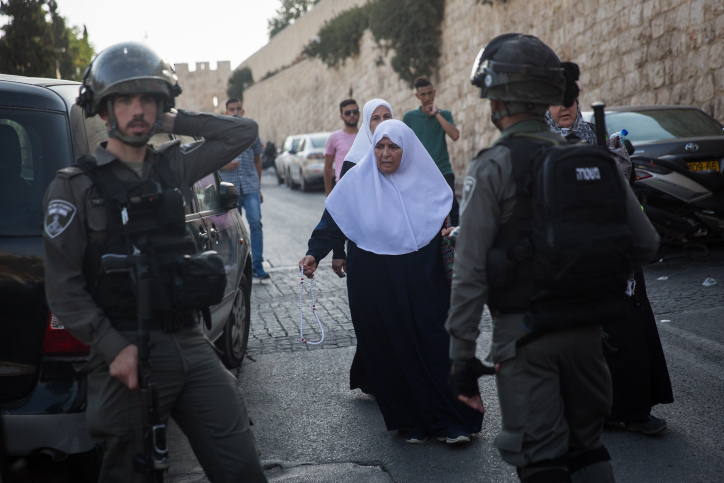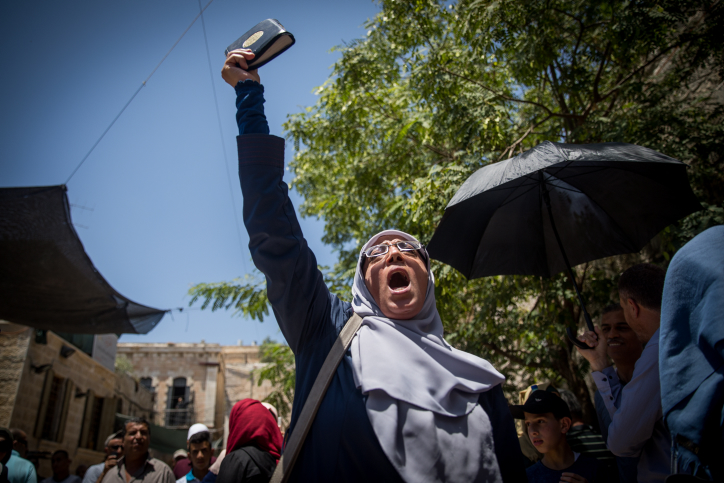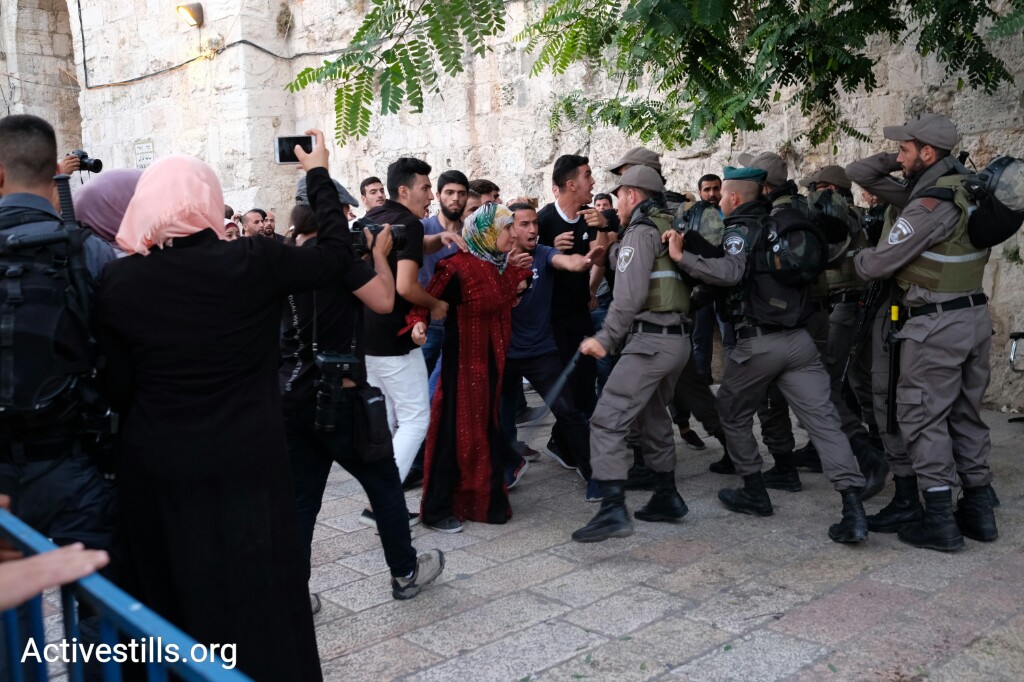Religious Palestinian women are taking in active role in the protests at the Temple Mount, shattering stereotypes of Muslim women as docile and subservient.
By Elhanan Miller

In the struggle of the Palestinian religious factions against Israel, the place of women has been missing from the battle. As opposed to Fatah and the left-wing factions, in which women often take an active role, religious Palestinian women are often left behind the scenes. The events of the last few weeks teach us, however, that the struggle over al-Aqsa is an exception.
In September 2015, former Defense Minister Moshe Ya’alon declared the Murabitat, a group of Muslim women activists at Al-Aqsa, a proscribed organization. After they were removed from the site, the women were quiet for some time, yet the women returned to play a central role in leading Palestinian resistance to Israel around the Temple Mount/Haram al-Sharif, and in the refusal to accept any change in the status quo around the site, including installing security measures.
Hamas’ news outlet, Al-Resalah, dedicated an article to activist Zeinab Amar, who claimed that the security cameras Israel is planning to install — after it removed the metal detectors — will allow it to control the entire area, effectively wresting control from the Jordanian Waqf. Amar insisted that Israel intends on changing the nature of the Mount in order to establish a synagogue “for settlers” on its eastern side. She added that the women will not halt their protest at Lions Gate until Israel reverses the steps it has taken.
Maha Younis, a resident of the village Arara in northern Israel, said similar things to Arab48, a news outlet associated with the Balad party. “The Murabitoun have patience in this battle. Our steadfastness is stronger than that of the occupation,” she said. “They may have installed metal detectors, but they exposed the true essence of the Palestinians and their love for Al-Aqsa Mosque.”

The television station Al-Ghad, which broadcasts from London through funding from the United Arab Emirates, published an article on July 25 under the headline: “The Jerusalemites are standing at the front lines with the occupation,” accompanied by a photograph of an Israeli soldier pointing his weapon at a woman in a hijab. “The role of the Jerusalemite Palestinian woman […] serves as a model in the national struggle, since she stands alongside the man before challenges and dangers.”
Photos of Palestinian women being removed from the Temple Mount/Haram al-Sharif by Israeli security forces are igniting the Palestinian street, necessitating a response by the men — especially the young ones.
Muhanned Halabi, the 19 year old who stabbed and killed Nehemia Lavi and IDF soldier Aharon Bennett in the Old City at the beginning of the “knife intifada” in October 2015, wrote on his Facebook page about the humiliation of Palestinian women at the Temple Mount. In response to a video of Murabitat activists being removed from the site by Israeli police, he published the following: “What’s happening to the women of Al-Aqsa is the same as is happening to our mothers and sisters. I do not believe that the people will reconcile itself to the humiliation. It will start an intifada.” That intifada was driven, among other things, from what Palestinians viewed as a direct affront toward the women by Israeli security forces.

Even Omar al-Abed, who murdered three Israeli settlers in Halamish two weeks ago, wrote on his Facebook page that he could not take the killing of women and young people. “Is it not shameful that we sit and do nothing?” he wondered.
Al-Aqsa Mosque and the entirety of historical Palestine are, in the Palestinian consciousness, often compared to a woman, and the role of the man is to defend her honor. Halabi compared Palestine to an orphaned teenage girl who has been abandoned by her brothers (Arab countries) to a fate of living under a cruel man (Israel) “without children, who does not know how to treat children.” A caricature published on Al-Resalah’s Twitter handle last week portrayed Al-Aqsa as a crying woman who has had a Star of David carved into her face by a monstrous hand.
The women’s awakening around the Temple Mount is an expression of a spontaneous desire to take part in the national struggle over a religious site, yet is also an effective and volatile tool for enlisting the masses. The police would do well to be sensitive to the role of gender in the Palestinian struggle in Jerusalem.
Elhanan Miller is a research fellow at the Forum for Regional Thinking, where this article was first published in Hebrew.
